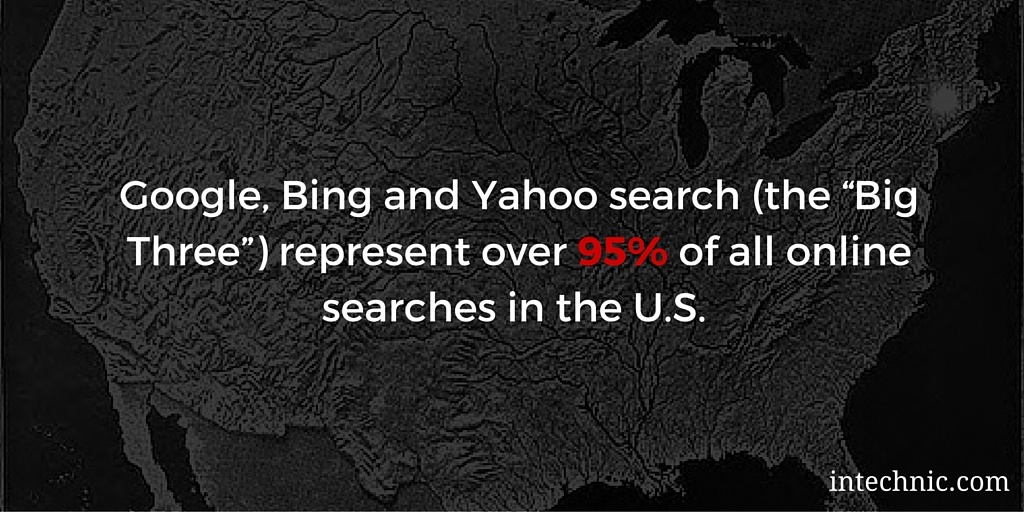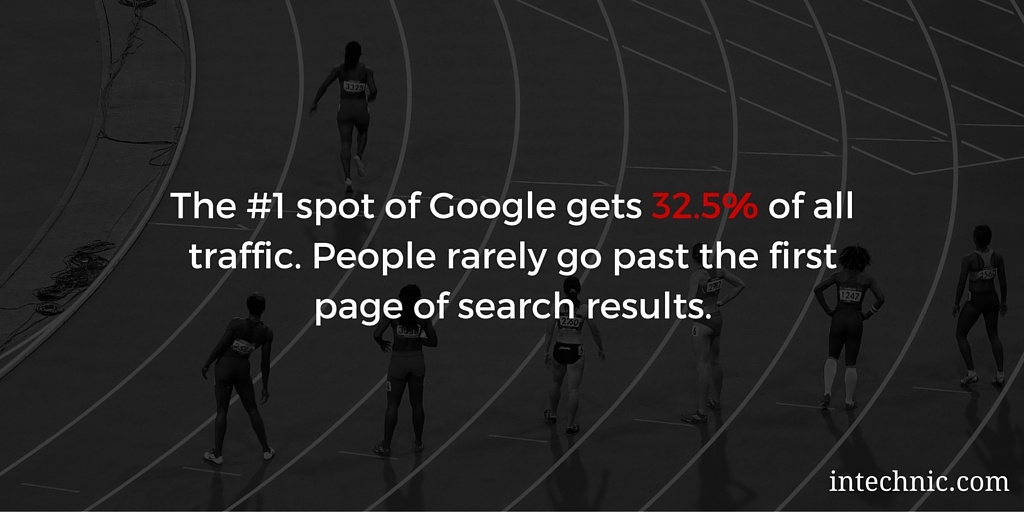Search Engine Basics Every Marketer Should Know
 When people talk about search engines, they're typically referring to Google, Bing and Yahoo (Yahoo search is powered by Microsoft). According to one study, these "Big Three" represent over 95% of all online searches in the U.S. There are many other major search engines in other countries, like Baidu in China, but the collective amount of searches they produce in the U.S. is insignificant.
When people talk about search engines, they're typically referring to Google, Bing and Yahoo (Yahoo search is powered by Microsoft). According to one study, these "Big Three" represent over 95% of all online searches in the U.S. There are many other major search engines in other countries, like Baidu in China, but the collective amount of searches they produce in the U.S. is insignificant.  The king of search is obviously Google. What made Google so popular is that it revolutionized the search engine industry by using link popularity to measure relevance of content. The method proved to be so effective that Google became a household word. Because studies have shown that roughly two-thirds of all searches are conducted on Google, we will focus on it primarily to define your basic SEO strategy.
The king of search is obviously Google. What made Google so popular is that it revolutionized the search engine industry by using link popularity to measure relevance of content. The method proved to be so effective that Google became a household word. Because studies have shown that roughly two-thirds of all searches are conducted on Google, we will focus on it primarily to define your basic SEO strategy. 
How Does Google Work?
According to Google, the web today is made up of billions of websites consisting of over 60 trillion individual web pages, and that number is growing every day. Google (and other search engines) work by crawling the Web, following links from page to page. Site owners can tell Google what to crawl, but Google also does a fine job on its own.
Google then sorts the pages based on their content (and hundreds of other factors), and maintains this data in what's called "the index." The index is Google's massive database of all metadata on the Web.  As you search for something, Google uses a number of programs and formulas (algorithms) to determine what you are trying to find (spelling, auto complete, synonyms, and much more). Based on these clues, Google pulls the relevant web pages from the index. Then Google ranks the results using more than 200 factors (such as content quality and freshness) to provide you the best possible matching results.
As you search for something, Google uses a number of programs and formulas (algorithms) to determine what you are trying to find (spelling, auto complete, synonyms, and much more). Based on these clues, Google pulls the relevant web pages from the index. Then Google ranks the results using more than 200 factors (such as content quality and freshness) to provide you the best possible matching results. 
Why is Ranking Important?
When people talk about search engine optimization, they are usually referring to improving the SERP ranking of your website. The SERP stands for Search Engine Results Page, that's the results listings page returned by a search engine in response to a keyword query. Ranking high on that page is the ultimate prize, and SEO is the process of getting there.
People rarely go past the first page of search results. More often, they just look at the first three to five results. Consider the following distribution of traffic in Google based on positions in search results:
1. 32.5% of all traffic
2. 17.6% of all traffic
3. 11.4% of all traffic
4. 8.1% of all traffic
5. 6.1% of all traffic
That's why ranking high in search results is critical. If your website is ranked #57 for a keyword, no one will ever get to it. Ranking that low is like not ranking at all. That's why SEO strategy at its most basic is about improving your positions for important keywords. 
How Does Google Rank Websites?
Google uses over 200 criteria to determine a ranking of a webpage for every keyword. Search engine algorithms are closely guarded secrets and there are armies of marketing and SEO professionals trying to reverse-engineer what affects ranking. We know many things starting with the quality and freshness of your content to load speed of your website and your activity on social media. One factor stands above all: link popularity. This is what made Google what it is today. Link popularity measures the number of other relevant websites linking to yours. In other words, the more other websites link to yours, the higher it is likely to rank.  When another website links to yours, Google looks at it as a signal that there is something of value on your website. When you have multiple websites linking to you, Google sums up these links so the more links you get, the better. However, not every link is counted with equal value. The most valuable links are from websites that have high link popularity themselves. If a popular website links to yours, they transfer some of this link popularity to you. If the same website also links to websites other than yours, the value of the link to you is diluted and divided between all other websites.
When another website links to yours, Google looks at it as a signal that there is something of value on your website. When you have multiple websites linking to you, Google sums up these links so the more links you get, the better. However, not every link is counted with equal value. The most valuable links are from websites that have high link popularity themselves. If a popular website links to yours, they transfer some of this link popularity to you. If the same website also links to websites other than yours, the value of the link to you is diluted and divided between all other websites. 
How Does Google Determine Keywords?
It all begins with a keyword. Someone types in a keyword into a search box and gets a myriad of results. We already talked about the importance of ranking high, but since search results are keyword-specific, how does Google know which keywords are associated with your website's pages?
Google analyzes the content of your website to determine the keywords. It looks at the text on your website, page titles and subheadings, navigation and even file names of your images and documents. In addition, Google looks at the keywords of the websites linking to you. If these websites are related or have similar content, Google considers these links as votes of confidence for a particular keyword. This is why related links from websites are typically better than unrelated links. 
What Is Google Doing to Improve Quality?
Google is continuously improving the quality and relevance of search results. After all, that's what Google is all about. They see anyone trying to cheat the system as a threat. Deceiving, low quality or irrelevant content doesn’t align with Google's vision of good user experience. That's why Google combats SPAM by devaluing and removing websites that produce bad content or try to manipulate the system.  Google openly fights the following types of SPAM: unnatural links, hacked websites, cloaking (displaying different content to search engines), content with little or no added value, parked domains, hidden text or keyword stuffing and a lot more. As you can see, Google does a lot to maintain the quality and relevance of search results, and you should adopt the same priorities for your website. The most effective and safest SEO strategy is to play by the rules. Next post: The Most Common SEO Mistakes to Avoid Interested in learning more SEO basics? Check out our free eBook below:
Google openly fights the following types of SPAM: unnatural links, hacked websites, cloaking (displaying different content to search engines), content with little or no added value, parked domains, hidden text or keyword stuffing and a lot more. As you can see, Google does a lot to maintain the quality and relevance of search results, and you should adopt the same priorities for your website. The most effective and safest SEO strategy is to play by the rules. Next post: The Most Common SEO Mistakes to Avoid Interested in learning more SEO basics? Check out our free eBook below: 









